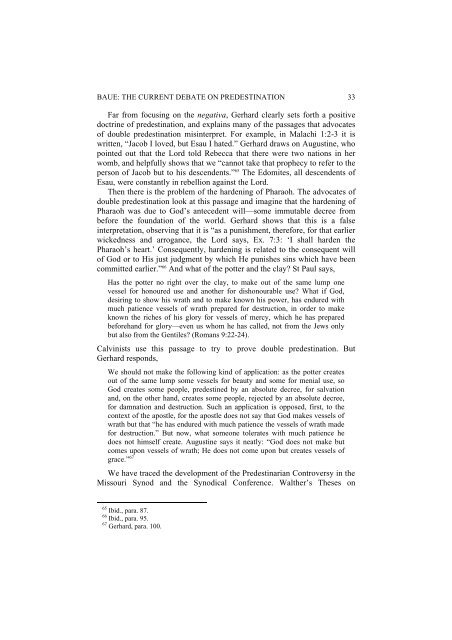LUTHERAN THEOLOGICAL REVIEW - Brock University
LUTHERAN THEOLOGICAL REVIEW - Brock University
LUTHERAN THEOLOGICAL REVIEW - Brock University
You also want an ePaper? Increase the reach of your titles
YUMPU automatically turns print PDFs into web optimized ePapers that Google loves.
BAUE: THE CURRENT DEBATE ON PREDESTINATION 33<br />
Far from focusing on the negativa, Gerhard clearly sets forth a positive<br />
doctrine of predestination, and explains many of the passages that advocates<br />
of double predestination misinterpret. For example, in Malachi 1:2-3 it is<br />
written, “Jacob I loved, but Esau I hated.” Gerhard draws on Augustine, who<br />
pointed out that the Lord told Rebecca that there were two nations in her<br />
womb, and helpfully shows that we “cannot take that prophecy to refer to the<br />
person of Jacob but to his descendents.” 65 The Edomites, all descendents of<br />
Esau, were constantly in rebellion against the Lord.<br />
Then there is the problem of the hardening of Pharaoh. The advocates of<br />
double predestination look at this passage and imagine that the hardening of<br />
Pharaoh was due to God’s antecedent will—some immutable decree from<br />
before the foundation of the world. Gerhard shows that this is a false<br />
interpretation, observing that it is “as a punishment, therefore, for that earlier<br />
wickedness and arrogance, the Lord says, Ex. 7:3: ‘I shall harden the<br />
Pharaoh’s heart.’ Consequently, hardening is related to the consequent will<br />
of God or to His just judgment by which He punishes sins which have been<br />
committed earlier.” 66 And what of the potter and the clay St Paul says,<br />
Has the potter no right over the clay, to make out of the same lump one<br />
vessel for honoured use and another for dishonourable use What if God,<br />
desiring to show his wrath and to make known his power, has endured with<br />
much patience vessels of wrath prepared for destruction, in order to make<br />
known the riches of his glory for vessels of mercy, which he has prepared<br />
beforehand for glory—even us whom he has called, not from the Jews only<br />
but also from the Gentiles (Romans 9:22-24).<br />
Calvinists use this passage to try to prove double predestination. But<br />
Gerhard responds,<br />
We should not make the following kind of application: as the potter creates<br />
out of the same lump some vessels for beauty and some for menial use, so<br />
God creates some people, predestined by an absolute decree, for salvation<br />
and, on the other hand, creates some people, rejected by an absolute decree,<br />
for damnation and destruction. Such an application is opposed, first, to the<br />
context of the apostle, for the apostle does not say that God makes vessels of<br />
wrath but that “he has endured with much patience the vessels of wrath made<br />
for destruction.” But now, what someone tolerates with much patience he<br />
does not himself create. Augustine says it neatly: “God does not make but<br />
comes upon vessels of wrath; He does not come upon but creates vessels of<br />
grace.” 67<br />
We have traced the development of the Predestinarian Controversy in the<br />
Missouri Synod and the Synodical Conference. Walther’s Theses on<br />
65 Ibid., para. 87.<br />
66 Ibid., para. 95.<br />
67 Gerhard, para. 100.













